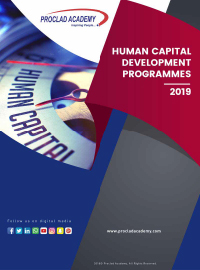Protocol, Public Relations & Event Management
| Ref No. | Dates | Venue | Fee (US$) | |
|---|---|---|---|---|
| PR 002 | 23 - 27 Feb 2020 | Dubai | 4500 | Register |
| PR 002 | 28 Jun - 02 Jul 2020 | Dubai | 4500 | Register |
| PR 002 | 01 - 05 Nov 2020 | Dubai | 4500 | Register |
Protocol, Public Relations & Event Management
Introduction
Event management is a very powerful tool for transmitting organisational values and achieving objectives. Protocol refers to the rules of behaviour that should be followed when hosting events or interacting with government officials and other organisational leaders/representatives. Protocol also comprises matters of cultural etiquette. Including public relations in the event planning will help to promote the event effectively.
Participants on PROCLAD Academy’s Protocol, Public Relations & Event Management training course will develop and strengthen the management of protocol and event functions. They will learn the tips and be able to avoid the traps of organising efficient events. This training course will help them to extend and apply PR skills to promote successful events, and to identify risks and how to minimise the impact.
The key features of PROCLAD Academy’s Protocol, Public Relations & Event Management training course are:
- Develop and utilise the core PR skills for event promotion
- Apply the principles of project management to plan, organise, and conduct successful events
- Ensuring that the events at home and abroad achieve strategic objectives
Learning Objectives
By attending PROCLAD Academy’s Protocol, Public Relations & Event Management training course, participants will be able to:
- Arrange and provide protocol services including logistics requirements
- Plan, arrange and co-ordinate corporate events
- Arrange logistics services for organised events
- Communicate with the media
- Communicate with the internal and external community
- Identify risks and minimise the impact
Target Audience
PROCLAD Academy’s Protocol, Public Relations & Event Management training course is intended for, but not limited to:
- Protocol Officers/Executives and Assistants
- Event Officers/Executives
- Conference/Exhibition/Meetings Organisers and Assistants
- Customer Relations Officers/Executives and Assistants
- Public Relations Officers/Executives
- Communications Officers/Executives
Training Methodology
PROCLAD Academy’s Protocol, Public Relations & Event Management training course incorporates inspiring lectures with structured lessons from the learning manual along with comprehensive workshops & case studies; captivating PowerPoint slides with videos to enhance learning; ongoing discussions with action planning; ample time for Q&A; training activities to reinforce key concepts within a fun learning environment.
Course Outline
- Role and responsibilities of the functions, internal and external teams
- Creating streamlined plans, policies, systems, structures and procedures
- Keeping up-to-date nationally and internationally
- Record-keeping, monitoring, updating and maintaining
- Appropriate policies, processes and procedures according to protocol
- Identifying target markets and objectives
- Clarifying message for each market
- Appropriate channels to reach guests, audiences and stakeholders
- Promoting organisation’s brand and enhancing its reputation
- Evaluation, feedback and lessons learned
- Written communication to prevent misunderstandings
- Oral communication including talking, listening and understanding
- Body language, facial expressions and gestures to prevent offence
- Organisational communication: media, photography, seating, timing, speeches
- Cultural: demonstrating respect for national and international protocol
- Planning and organising events, conferences and visits
- Organising, exhibiting at or attending exhibitions
- Trade visits and the protocol for them
- Greeting foreign dignitaries, flying flags correctly and meeting expectations
- Order of precedence for official ceremonies
- Identifying all the possible risks for an event
- Evaluation of likelihood and impact
- Ways to deal with risk
- Creating contingency plans


